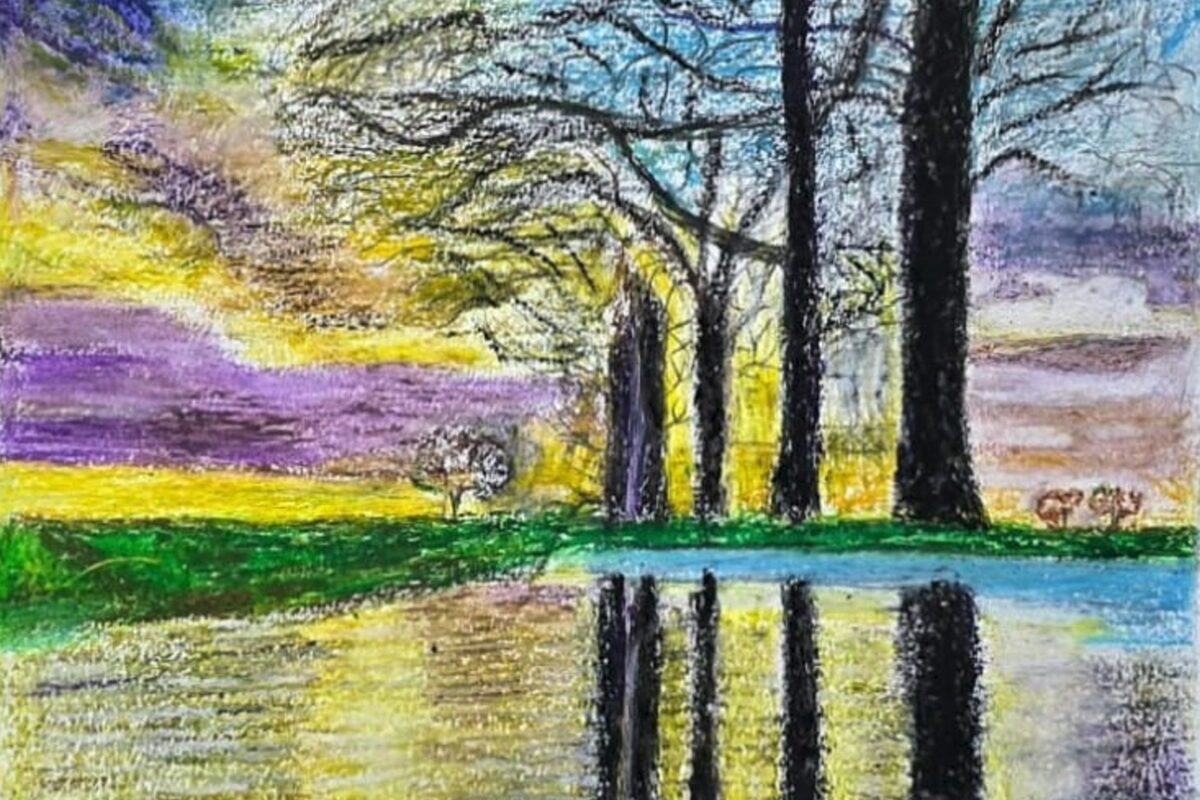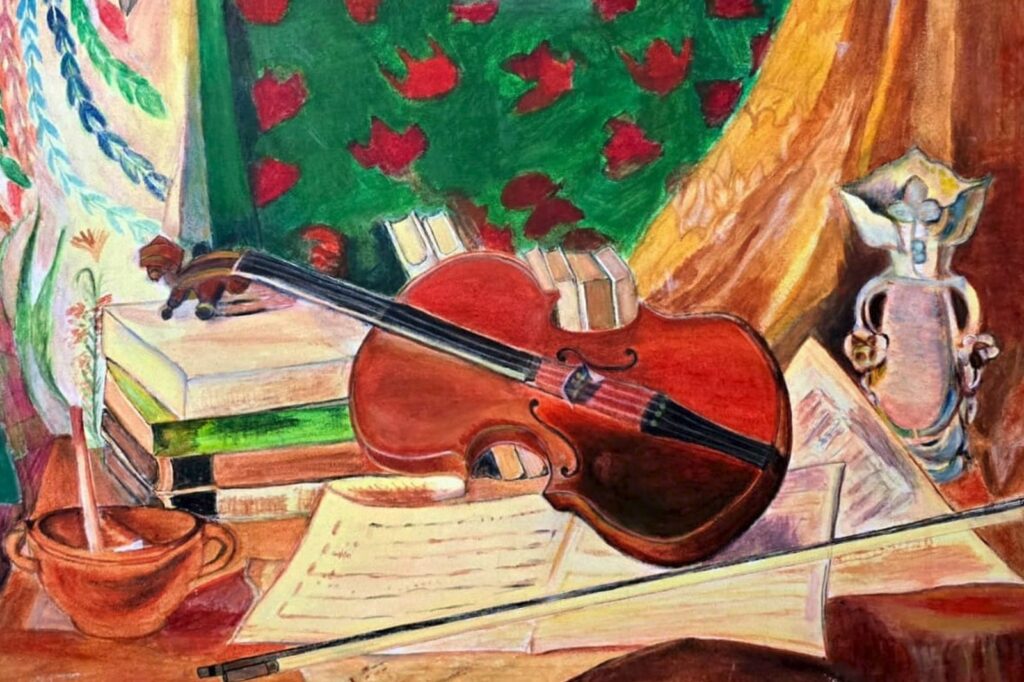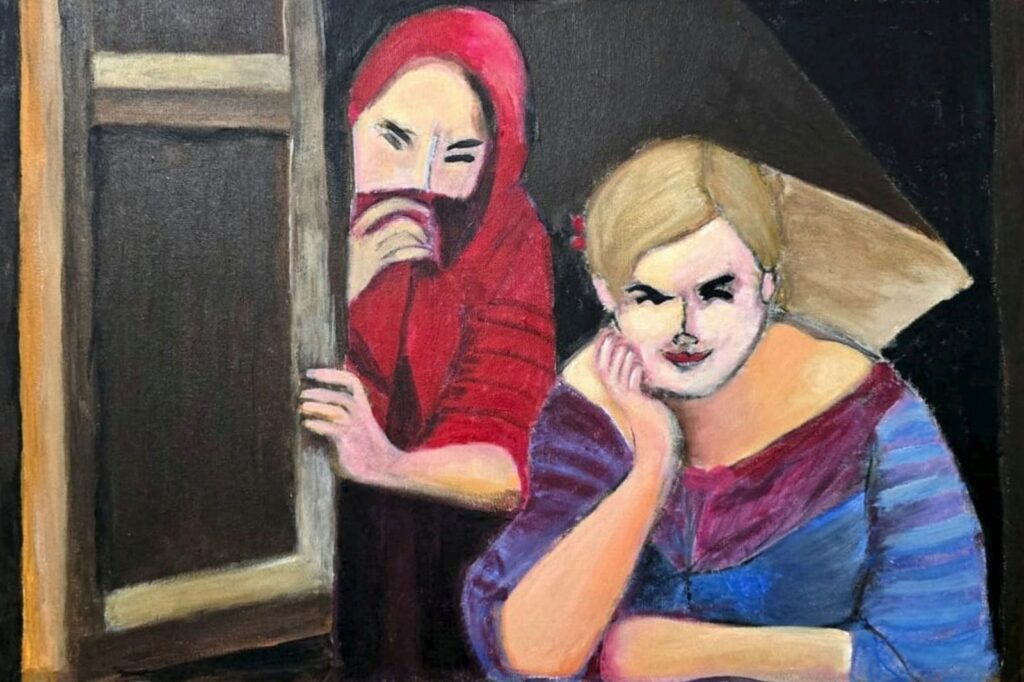
Where society sees potential as the privilege of youth, my 70-year-old mother stood as a gentle rebellion, though truthfully, she’s been challenging limits all her life.
Wafaa grew up in the Qoubbé area, a warm, close-knit corner of Tripoli, where her father and four of his brothers, along with their sister, lived in three neighboring buildings. Family wasn’t just part of life; it was the structure it stood on. But in these traditional surroundings, the path laid out for girls was often shaped more by custom than by choice.
At 13, while heading to school one morning, her cousin Samir, 16 years older, shared with his father that he wanted to marry her. His father, Bashir, the eldest of his siblings, conveyed the proposal to Wafaa’s father, Mustafa. The decision was made swiftly, as was customary. Wafaa got married that year and moved into an apartment just upstairs from her childhood home.
Still, the schoolgirl in her hadn’t vanished. The morning after her wedding, she got dressed in her school uniform and walked to class. The principal met her with quiet finality: “You’re married now. You can’t attend school.” Just like that, the door was closed. But Wafaa was not one to surrender to closed doors.
Ten years later, she had three children, and I was the fourth. We moved into a new apartment on Moutran Street. I was only 40 days old. My grandfather Mustafa moved too, into a home on Sakafe Street, just a few minutes away. These two homes, ours and our grandparents’, became the heart of our lives. It was within those familiar walls, between the ordinary rhythms of daily life, that my mother’s quiet, extraordinary journey began.

Wafa Nazer – 1995
When I was about six or seven years old, I remember seeing my mother quietly studying at home. She was preparing for the Lebanese baccalaureate, while raising four young children. She didn’t dare tell my father. She knew he wouldn’t approve. Not out of malice, but because in a city as conservative as Tripoli, his resistance was the product of a mindset shaped by a time and place where her kind of dreams stretched far beyond the boundaries of his experience. In his eyes, life was already complete. She had a home, children, security, what more could anyone need? Their age difference made deep conversations difficult, and communication, about dreams, identity, purpose, was something they hadn’t learned how to do. Their age difference, almost a generation, created a silent distance. They didn’t know how to speak the same emotional language, and dreams like hers didn’t fit into the framework he was taught to believe in.
That first year, she didn’t pass. But she didn’t give up. The following year, on the day the results were to be announced on national radio, she finally told my father. They used to announce results by candidate numbers, not names. Her number came up. She had passed. Abdel Halim’s joyful song played – “و حياة قلبي وأفراحه”-and we all sang along, proud and hopeful.
My father, too, celebrated, believing this was the pinnacle of her ambition, that she had finally reached the end of that chapter. But what he saw as an ending was, in truth, only a doorway reopened. The dream hadn’t faded, it had simply been waiting, quietly, for its time to come again. Wafaa was only getting started.
She enrolled at the Lebanese University to study Plastic Arts. She would leave us at our grandmother’s house and attend classes just across the neighborhood. Between the demands of motherhood and the weight of academia, she struggled to keep up with her attendance and ultimately failed the year. But undeterred, she enrolled again, quietly, privately, holding onto a dream too precious to abandon or explain.
Then one day, a man walked into the café where my father was sitting and congratulated him on Wafaa’s success. Dad was stunned. He hadn’t known that this man was mum’s professor at University. At home, he questioned her. “Why do you need a degree? You’re not looking for a job. I’m providing everything.”
He simply didn’t understand why she would chase this dream. Eventually, she paused her studies once more.
Years later, she quietly completed her BA and then a Master’s in Sociology, still without dad’s knowledge. She wanted to work. It took her some time, a few fights, but she eventually received his blessing. She went on to teach Arabic for 23 years.
When she retired at 64, she began to study Arabic calligraphy. For nearly a decade, she practiced Arabic calligraphy with grace and determination. Then came 2019, a year of turmoil in Lebanon. The economy collapsed, and banks froze our accounts. My mother lost her life savings.
But instead of bitterness, she chose something bolder. She decided, once more, to study art. The dream she had carried for more than 30 years. At the age of 70, she enrolled again at the Lebanese University in Tripoli, this time as a student in the Faculty of Fine Arts, specializing in Plastic Arts.

Wafa Nazer – 2021
She sat among students five decades younger than her, entering classrooms not as a stranger, but as a quiet force, until the pandemic hit hard in early 2020. The world turned upside down, and she suddenly had to shift to online classes from home. For someone born in the mid-20th century, the digital world was an unfamiliar language for her, strange, shifting, and often overwhelming. Logging into virtual classrooms, uploading assignments, navigating platforms designed for digital natives, it all felt like stepping into foreign terrain. Most of her courses were in Arabic, but sprinkled throughout were materials, presentations, and assignments in English or French. One course was conducted entirely in English.
Each unfamiliar word was a mountain to climb, but she climbed it. With a dictionary in one hand, and me, her daughter, on the other, she translated, interpreted, and persisted. Word by word, image by image, she made her way through. Technology was never her comfort zone, but her determination made it her companion.
Her classmates didn’t always understand what drove her. To them, she may have seemed out of place, an unfamiliar presence in a space they thought was meant for youth alone. And while some professors did their best within the limits of long hours, tight schedules, and the harsh realities of underfunded public education, empathy wasn’t always present. A few even justified their detachment by saying the university system wasn’t designed with seniors in mind.
We speak so often, so loudly, about inclusivity. We advocate for it in race, gender, ability, and identity. We teach it in classrooms and post about it on billboards and social media. But somewhere along the way, I find myself wondering… where does age fall in our collective promise of inclusion?
When it comes to education, especially higher education, are we truly inclusive—or do we quietly draw lines? Do we decide, consciously or not, who belongs and who no longer does? Do we, in our pursuit of progress, leave behind the very people who carry the wisdom and hunger of long-lived lives? Are we still human when we choose efficiency over empathy? Have we allowed ourselves to label and exclude those who walk slower, process differently, or ask questions we’re not used to hearing?

Wafa Nazer – 2023
A university is not merely made of software, whiteboards, and timetables. At its essence, it is a sanctuary of human potential. It is a place where intellect is sharpened, but more importantly, where the spirit is invited to unfold. Professors are not just transmitters of information; they are guides, mentors, keepers of the flame. They hold the sacred power not only to educate but to elevate.
And in that sacred space, age should never be a dividing line. A student who enters a classroom at seventy carries a different kind of hope, one that has waited, perhaps decades, to be seen. One that may burn slower, but often brighter. What they need is not pity, nor indulgence, but presence, a little patience, and belief.
They don’t ask for shortcuts. They ask for access. They don’t seek praise. They seek purpose.
Education, in its highest form, is not about uniformity, it is about transformation. And no transformation, none, is possible without compassion, empathy, and the unshakable conviction that every soul, no matter when it arrives at the door, deserves to be welcomed in, guided forward, and lifted higher.
Aging is not a decline; it is a continuation. And in this vital chapter of life, mental, emotional, and physical wellbeing are deeply interconnected. Empowering seniors requires more than access to healthcare or physical activity; it requires purpose, connection, dignity, and the belief that they are still and always, becoming.
Because well-being isn’t just about health, it’s about humanity. And nowhere is this more apparent than in the deep psychological need for seniors to feel seen, included, and relevant. We often talk about inclusivity. But where does age fall in that conversation?
In our pursuit of innovation and progress, do we forget to invite those with the deepest wisdom and the longest stories? Do we unconsciously exclude older adults from spaces of growth, such as higher education and leadership? A society that values inclusivity must value seniors not only in words, but in meaningful, actionable ways.
Grit, Growth, and Lifelong Becoming. Talent matters. But effort matters more. And sustained effort over time? That’s grit. Grit is not just working hard. It’s working hard at something meaningful—for a long time. It’s continuing when the mind tires, when the hands slow, and when uncertainty clouds the path. Grit is showing up when others don’t. It’s learning from failure instead of folding. It’s keeping your eye on the long game when the short game gets messy. And for seniors, grit becomes a tool of reinvention.

Wafa Nazer – 2020
If you want to build grit after retirement—or at any age—here’s a suggestion how:
– Find something worth caring about
– Expect difficulty and prepare for it
– Celebrate consistency, not just outcomes
– Surround yourself with people who don’t quit
And Wafaa didn’t quit, she kept showing up anyway.
Despite the steep learning curve and the occasional stumbling through unfamiliar digital terrain and unfamiliarity with the English language, she moved forward with grace, resolve, and quiet strength. What she lacked in technical fluency, she more than made up for with presence, with essence, with authenticity. She didn’t move quickly but she moved deliberately. Every step she took was meaningful.
While others relied on search engines and sleek platforms to find creative direction, she turned inward. Her inspiration didn’t come from Pinterest boards or online galleries, it came from memory, intuition, and heart. Her art didn’t echo what was popular, it resonated with what was real.
Each brushstroke whispered a story. Each sketch held a memory. Her work was crafted from lived moments, soft joys, deep losses, childhood scenes, quiet rebellions, and the ordinary beauty of a long and layered life.
In a world driven by fast trends, filtered images, and easy replications, she chose truth. Not polished, not perfect but raw, tender, and human. And in that quiet truth, her work found its deepest power. Living with her over the past nine years, I’ve witnessed firsthand the toll this journey has taken on her physically, emotionally, and spiritually.

Wafa Nazer – 2024
She rarely speaks of her struggles, but they show themselves in quiet ways. In the fatigue that lingers after long days of effort. In the silent doubts that sometimes flicker across her face. And in those rare, luminous moments of joy when something finally clicks, when the effort feels seen, when she presses “submit” and breathes out a sigh of quiet victory.
I often wish her classmates or professors could have shared even a sliver of that joy with her outside the confines of a classroom or deadline. To witness what it means, truly means, to achieve something at her age not for grades, or jobs, or recognition, but for the sheer fulfillment of becoming.
All she ever truly needed was a little more time, a touch more guidance, and a tender sprinkle of patience. Sometimes, it doesn’t take much—just enough to make someone feel seen, valued, and capable. Just enough to help them carry the weight a little further and walk the rest of the road with dignity and light.
And yet, she didn’t give up.
This isn’t just the story of a mother returning to school. It’s the story of a woman refusing to be defined by age or circumstance. A woman reclaiming her right to grow, to learn, to express, and to dream.

Wafa Nazer – 2025
Wafaa is not simply a student. She is a reminder that life doesn’t end at 70, or 60, or 50. She is a testament to perseverance, to passion, and to the extraordinary beauty of starting again.
Her story reminds us that courage sometimes whispers, and that strength often wears the face of a mother with a paintbrush in hand, drawing a new chapter in colors she never thought she’d use.
Rima Nazer is a Communications Specialist & Co-Founder of Jardins D’EDEN, a brand of artisanal natural products that empower women and preserve cultural craftsmanship, blending entrepreneurship with social impact and storytelling.
The views in this story reflect those of the author alone and do not necessarily reflect the beliefs of NOW.







